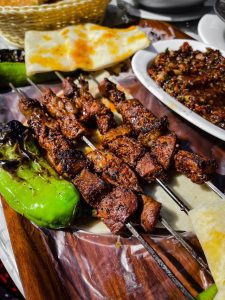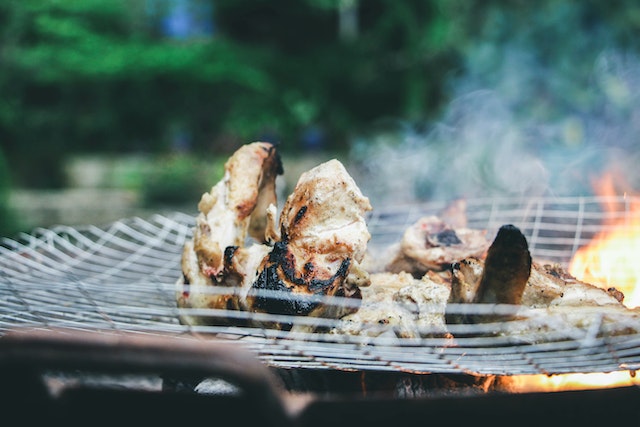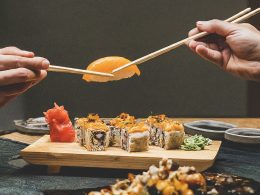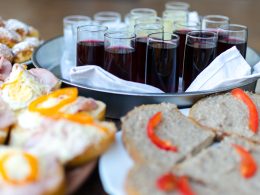In the late summer, as the sun lingers a bit longer, and the air carries a hint of warmth, there’s no better time to gather your loved ones for a delightful outdoor feast. And what could be more perfect for such an occasion than succulent chicken skewers?
In this article, we’ll explore the art of creating late-summer chicken skewers that not only tantalize your taste buds but also contribute to the environment and your overall well-being. Our source of culinary wisdom for this journey is none other than the legendary Julia Child, whose expertise continues to inspire chefs and home cooks alike.
Meet Julia Child: A Culinary Icon
Julia Child’s name is synonymous with culinary mastery. With a career spanning decade, she’s left an indelible mark on the world of gastronomy. Her groundbreaking cookbook, “Mastering the Art of French Cooking,” introduced the joys of French cuisine to American kitchens. Her television show, “The French Chef,” made her a household name and showcased her warm and engaging teaching style.
With numerous accolades, including the prestigious Peabody Award and several James Beard Awards, Julia Child’s credentials are unquestionable. Her passion for food, dedication to teaching, and relentless pursuit of excellence make her the perfect guide for our culinary exploration.

The Essence of Local and Seasonal
Late summer is a season of abundance. Farmers’ markets burst with colorful produce, and local artisans offer an array of fresh ingredients. Julia Child understood the significance of these treasures and often emphasized the importance of using local and seasonal ingredients in her recipes.
Benefits of Local Sourcing
- Enhanced Flavor: Locally sourced ingredients are fresher, preserving their natural flavors and aromas. This freshness elevates the taste of your dishes, and chicken skewers are no exception.
- Supporting Local Communities: When you buy local, you support your community’s farmers and artisans, contributing to their livelihoods and the local economy.
- Reduced Environmental Impact: Shorter transportation distances for local ingredients mean fewer carbon emissions, reducing your carbon footprint.
Embracing Seasonality
- Optimal Freshness: Seasonal ingredients are at their peak in terms of flavor and nutrition. Incorporating them into your late-summer chicken skewers ensures you’re serving the best.
- Cost-Efficiency: Seasonal produce is often more affordable because it’s abundant. This means you can create delicious skewers without breaking the bank.
- Environmental Responsibility: Seasonal ingredients are more sustainable because they require fewer resources for cultivation and transportation.
Crafting Your Late-Summer Chicken Skewers
Now that you appreciate the importance of local and seasonal sourcing, let’s delve into creating the perfect late-summer chicken skewers. Julia Child’s expertise shines through in these tips:
1. Select Your Chicken Wisely
Choose locally raised, free-range chicken. Their superior quality and taste will elevate your skewers.
2. Embrace Seasonal Produce
Incorporate late-summer vegetables like zucchini, bell peppers, and cherry tomatoes. These colorful additions add flavor and vibrancy.
3. Marinate with Local Herbs
Julia Child was a proponent of using fresh herbs. Visit your local farmers’ market to find an array of aromatic herbs for your marinade.
4. Grill to Perfection
Whether you opt for a charcoal or gas grill, Julia’s advice on achieving the perfect sear remains timeless.

5. Sustainable Skewers
Consider using sustainable bamboo or metal skewers for your chicken. These can be reused, reducing waste.
Comparative Table: Local vs. Non-Local Ingredients
Let’s compare the benefits of using local ingredients in your late-summer chicken skewers against non-local alternatives:
| Aspect | Local Ingredients | Non-Local Ingredients |
|---|---|---|
| Flavor | Enhanced, fresher flavors | May lack freshness |
| Community Support | Supports local farmers | May support distant growers |
| Environmental Impact | Reduced carbon footprint | Higher carbon footprint |
| Freshness | Peak freshness | Variable freshness |
| Cost | Competitive prices | May be more expensive |
| Sustainability | More sustainable | Potential sustainability issues |
Conclusion
As late summer beckons, remember that your culinary choices can not only delight your palate but also contribute to a more sustainable and vibrant community. By following Julia Child’s wisdom and incorporating local and seasonal ingredients into your late-summer chicken skewers, you’ll savor the taste of the season while supporting the environment and local growers.












